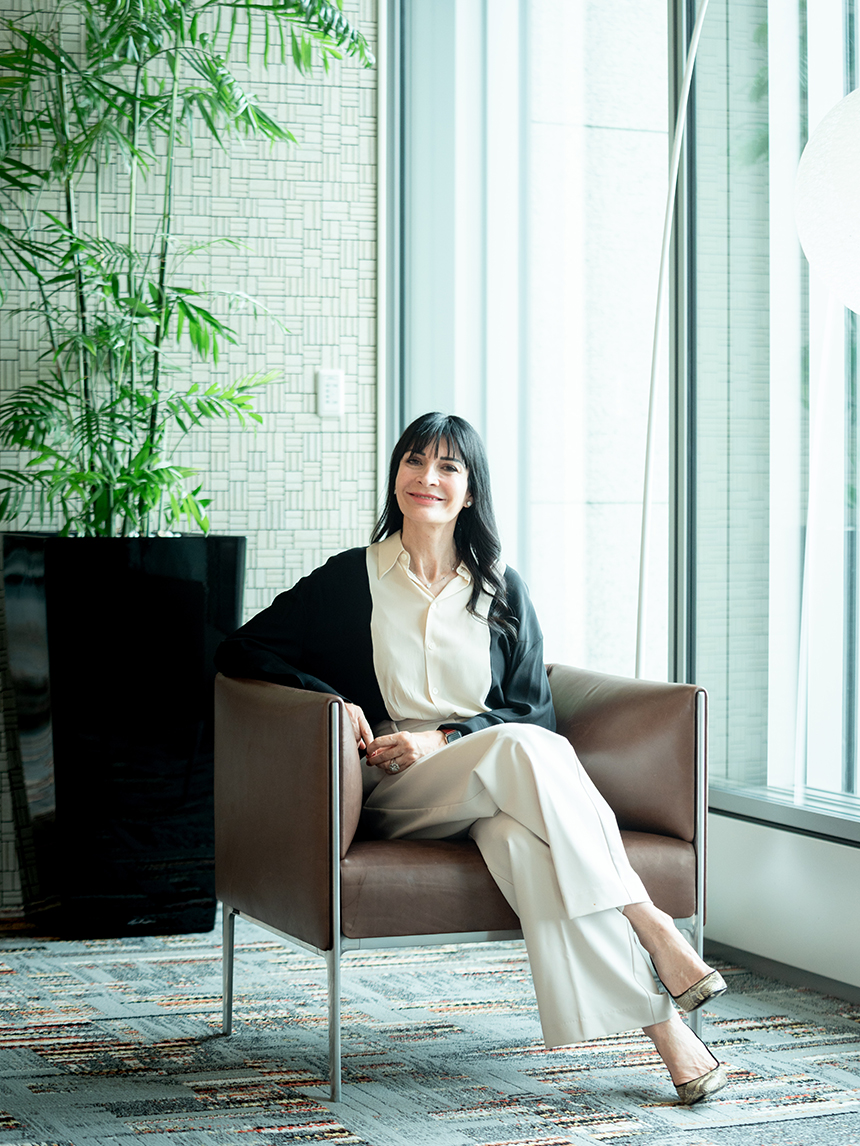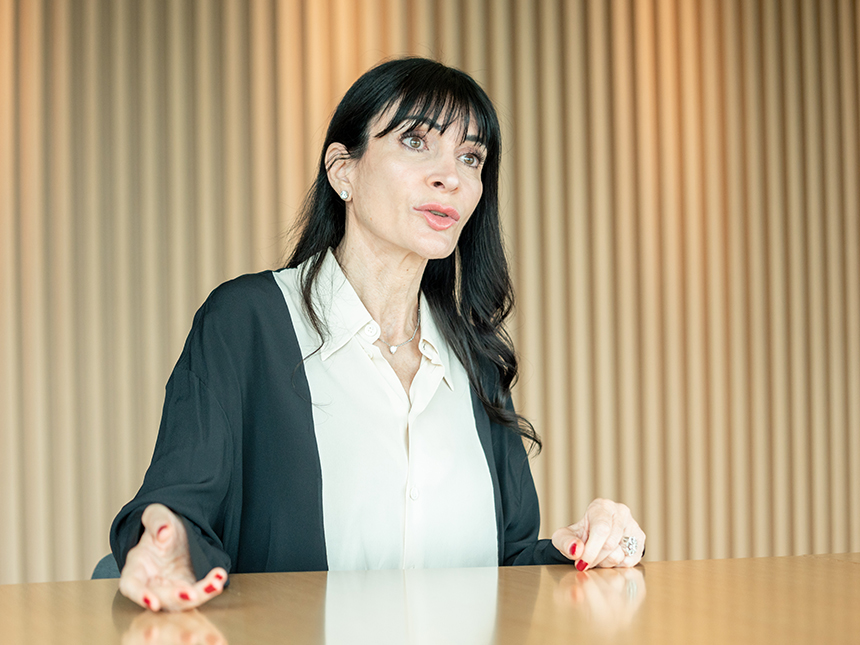Chief Sustainability Officer’s Message

- My Mission as a Chief Sustainability Officer, CHRO, and CDEIO
- Our Progress in Sustainability
- Message to Our Stakeholders
My Mission as a Chief Sustainability Officer, CHRO, and CDEIO

At Hitachi, "sustainability" and "strategy" are inseparable. Sustainability is strongly integrated into our strategy and is at the core of Hitachi Group Identity, rooted in the sincere belief of our founder, Namihei Odaira. He firmly believed that through the development of superior, original technology and products, we could contribute to society. This sincere belief has been at the heart of Hitachi for over a century.
Our more than 110-year history is a testament to this belief. From the beginning, Hitachi has supported the development of society and the improvement of people's lives through unique and innovative technologies. While Hitachi contributed to these broader goals, the company itself flourished. In essence, Hitachi embodies the philosophy that societal contribution through technology and a company’s sustainable growth are fundamentally interconnected and mutually reinforcing.
Today, Hitachi's sustainability management focuses on addressing Planetary Boundaries and Wellbeing. Grounded in our universal management philosophy, we are dedicated to creating a sustainable society, looking both at the present and the future.
As a member of Hitachi's management team, I strive to make decisions based on a comprehensive understanding of what society and the world need today and in the future. This holistic approach defines my sustainability leadership.
As a leader of Hitachi's sustainability efforts, I have always valued looking at issues from multiple perspectives. What benefits one group might be a disadvantage to another, and actions that benefit the current generation in the short term can pose challenges for future generations.
With my appointment as CHRO, in addition to my roles as Chief Sustainability Officer and CDEIO since fiscal 2024, my responsibilities have expanded to include human resources.
Today's social issues are so complex that they cannot be solved with a conventional way of thinking. Solving them requires a new, agile, and holistic approach while also being creative. The source of such innovative thinking and creativity is our people from all over the world with various backgrounds. This is why Hitachi is committed to integrating sustainability, human capital management, and diversity, equity, and inclusion (DEI) at the most senior level. Moving away from conventional thinking and leveraging people's creativity in sustainability efforts helps us address social issues more effectively and elevates employee engagement as they contribute to solving these issues through their daily work.
Moreover, at Hitachi, we believe that non-financial considerations underpin financial success, and enhancing people’s uniqueness will foster long-term financial growth.
Our Progress in Sustainability
Hitachi has identified six material topics and 15 sub-material topics under our sustainability management framework, and various initiatives are well underway. Looking back on fiscal 2023, we successfully met most of our sustainability goals and KPIs. We will continue to accelerate our evolution and enhance our practices to achieve more advanced sustainability management.
Advancing Environmental Goals

Some of the notable progress we made in the area of environment relates to decarbonization and circular economy.
Regarding our decarbonization efforts, we are making good progress with our internal initiatives, achieving a 74% reduction in CO2 emissions at our business sites compared to the base year of fiscal 2010. We are also working with our customers to reduce society’s CO2 emissions through our Social Innovation Business. As of fiscal 2023, we are forecasting to contribute to approximately 153 million metric tons (Mid-term Management Plan 2024 three-year average) of avoided emissions. Significant contributions came from Hitachi Energy, which specializes in electric power transmission and distribution.
The total grid-connected capacity of Hitachi Energy’s HVDC technology now stands at 150 GW, equaling Japan's peak demand. This milestone reflects the increasing global shift toward clean energy. To support this growing demand, Hitachi Energy has hired over 8,000 new employees globally and has invested $3 billion in manufacturing, engineering, and R&D since 2020. These efforts underscore our commitment to supporting our customers as long-term strategic partners and highlight the impact of our sustainability initiatives.
In circular economy, our reduction rate in water use per unit compared to fiscal 2010 was 30%, and 75% of our sites achieved zero waste to landfill.
To reduce environmental impact, we are transforming our business model, shifting toward using fewer raw materials, water, and other resources more efficiently and sustainably. As a company with a long history in manufacturing, we recognize the need to approach production with a new mindset.
We are also moving from a "sell-only" business to a "service-type" business model, where we focus on the use of products rather than just their ownership. This shift not only aligns with our sustainability goals but also ensures we remain relevant and competitive in the evolving market.
Our DEI Initiatives
As a global company, Hitachi boasts a rich and diverse workforce, and we believe that incorporating the perspectives of diverse individuals into our management and business operations fosters innovation and drives our growth. DEI is truly the engine behind Hitachi's success and is a core business driver that supports us in reaching our MISSION.
Creating an inclusive environment for all people, regardless of their diverse backgrounds, age, gender, sexuality, family structure, disability, race, nationality, ethnicity, or religion, is essential to unlock the full capability of our approximately 270,000 employees worldwide.
At the core of our DEI strategy, we focus on three topics: gender diversity, cultural diversity, and multi-generation. In fiscal 2023, we revised our DEI Policy to more comprehensively respect invisible human diversities, including LGBTQIA+, disabilities, and neurodiversity, and we are implementing specific measures.
As a result of our efforts, the ratio of women and non-Japanese nationals appointed to the senior management layer, reached around 12% and 25% respectively, making headway toward our targets of 30% by fiscal 2030.
We also made an important step forward in embedding DEI in our daily work by including DEI KPIs in employees’ performance reviews. This will drive behavior change and a shift in mindset toward a more inclusive workplace.
Through these approaches, we will ensure that our employees feel engaged and that they play an integral part in what we do as a company.
Generative AI and Sustainability Management
In 2023, we witnessed an epoch-making technology, generative AI, take the world by storm, impacting industries and society as a whole.
Generative AI can significantly improve work efficiency, allowing people to focus on more value-added and creative tasks. However, as its use expands, the demand for data centers will rise, leading to increased power consumption and CO2 emissions.
So how should we view this innovative technology from the perspective of balancing "planetary boundaries" and "wellbeing"?
At Hitachi, we aim to analyze both the positive and negative impacts of generative AI from multiple perspectives, including environmental impacts and ethical implications. Our goal is to derive optimal solutions that enhance society’s wellbeing while staying within planetary boundaries.
Securing top-tier digital talent is crucial for Hitachi, especially in this context and with our business centered around Lumada. Our digital talent workforce has grown from 83,000 in fiscal 2022, to 95,000 in fiscal 2023, and we will continue strengthening the acquistion and development of digital talents to 97,000 by fiscal 2024 as per our original target.
Message to Our Stakeholders

Hitachi has been dedicated to reforming our business portfolio with a focus on the Social Innovation Business under the slogan of “Hitachi Social Innovation is POWERING GOOD.” We are committed to contributing to a sustainable society and to people's happiness through various social innovation initiatives based on this concept. This approach has enabled Hitachi to grow sustainably, which I believe is reflected in our stock price, market value, and reputation for sustainability management, including our performance on ESG evaluations.
As the global company we have become, I truly believe that we can do even more to make a positive impact on a global scale through our Social Innovation Business. As Chief Sustainability Officer, CHRO, and CDEIO of Hitachi, my goal is to foster collaborations that transcend the boundaries of geographical regions and business fields, unleashing our full capabilities.
I feel that society and the world trust Hitachi and have high expectations of us, and we are committed to continuing to meet and exceed these expectations.
Lorena Dellagiovanna
Senior Vice President and Executive Officer, Chief Sustainability Officer,
CHRO, General Manager of Human Capital Group and CDEIO
Hitachi, Ltd.